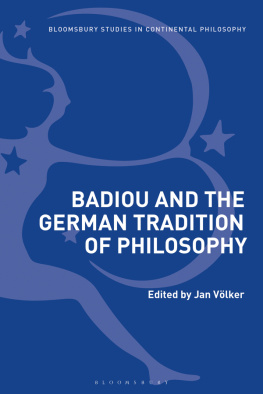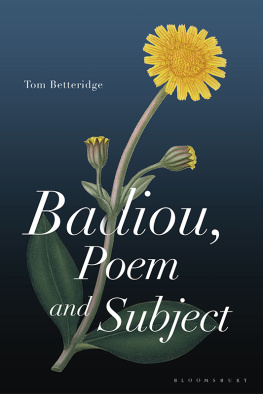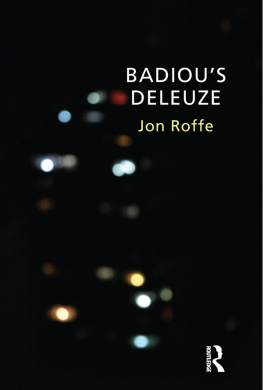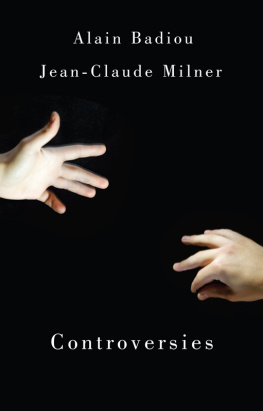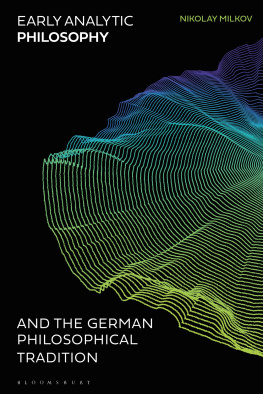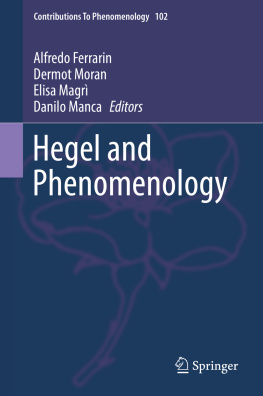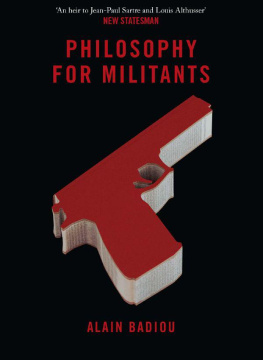It all started with a conference, one of the classical constellations of a philosophical moment, held at the Berlin University of the Arts in January 2016. This book itself forms another constellation of a different philosophical moment, since it is by no means a mere collection of papers delivered at this conference, each text having been fundamentally changed in the interim. Further authors have also joined. Philosophy is marked by the span between a discussion and a book, neither one being reducible to the other, a span that unfolds a real time of philosophy itself.
I thank all the contributors for their patience, their strength and their willingness to work on this project up to this intermediary result for what cannot but be a debate to be continued. Special thanks go to Alain Badiou, our generous interlocutor, who was supportive and encouraging from the moment of the first vague plans onwards.
I also thank Bloomsbury, especially Liza Thompson and Frankie Mace, for their willingness to publish this book and for their backing throughout the work. The Institute of Art History, Art Theory and Aesthetics at the Berlin University of the Arts also strongly supported the project, for which I am grateful. Finally, I thank Steven Corcoran for his ever-reliable editorial assistance.
Contributors
Alain Badiou is a philosopher, playwright, novelist, mathematician and political activist. He is the author most notably of Theory of the Subject (2009), Being and Event (2006), Being and Event II: Logics of Worlds (2009) and LImmanence des vrits (2018).
Rok Benin is a research fellow at the Institute of Philosophy, Research Centre of the Slovenian Academy of Sciences and Arts (ZRC SAZU). He is the author of the book Monadless Windows: Aesthetics from Heidegger to Rancire (in Slovenian, 2015) and several articles, including Proustian Developments: The World and Object of Photography, SubStance, vol. 3 (2017).
Svenja Bromberg is Lecturer in social theory and Marxism in the Department of Sociology at Goldsmiths, University London. Her publications include Euro Trash (2016, ed. with Birthe Mhlhoff and Danilo Scholz) and several articles, including Badious Recommencement of the Young-Hegelian Purification of Politics: A Response to Ishay Landa, International Critical Thought, vol. 4 (2014): 36783.
Justin Clemens is an associate professor at the University of Melbourne. His recent publications include Badiou and His Interlocutors (2018) and What Is Education? (2017), both co-edited with A. J. Bartlett.
Alexander Garca Dttmann teaches philosophy at the University of the Arts (UdK) in Berlin. His latest publications focus on contemporary art and the question of ideology (Was ist Gegenwartskunst? Zur politischen Ideologie, 2017) and on the origin of the work of art (Love machine: Der Ursprung des Kunstwerks, 2018).
Dominik Finkelde SJ is professor of contemporary philosophy and epistemology at the Munich School of Philosophy. He is the author of Excessive Subjectivity: Kant, Hegel, Lacan and the Foundations of Ethics (2017) and the editor of Badiou and the State (2017).
Christoph Menke is a professor in the Department of Philosophy at the Goethe Universitt Frankfurt am Main. Book publications in English include The Sovereignty of Art: Aesthetic Negativity after Adorno and Derrida (1998) and Law and Violence: Christoph Menke in Dialogue (2018).
Rado Riha is a senior research fellow and currently head of the Institute of Philosophy, Centre for Scientific Research at the Slovenian Academy of Sciences and Arts. His publications include The Second Copernican Turn in Kants Philosophy (2012) and Kant in Lacanscher Absicht: Die kopernikanische Wende und das Reale (forthcoming).
Frank Ruda is Senior Lecturer of Philosophy at the University of Dundee, Scotland. His recent publications include The Dash The Other Side of Absolute Knowing (with Rebecca Comay, 2018) and Reading Marx (with Slavoj iek and Agon Hamza, 2018).
Jelica Sumic is a senior research fellow at the Institute of Philosophy, Research Centre of the Slovenian Academy of Sciences and Arts. She has published a number of philosophical works, including Eternity and Change: Philosophy in the Worldless Times (2012). Currently she is working on a forthcoming volume entitled Volont et Dsir.
Jan Vlker is a research associate at the Institute of Fine Arts and Aesthetics at the Berlin University of the Arts and visiting lecturer at the Institute of Philosophy of the Slovenian Academy of Arts and Sciences in Ljubljana and at Bard College Berlin. Recent publications include (as editor) Alain Badiou and Jean-Luc Nancys German Philosophy: A Dialogue (2018) and an international issue of Filozofski vestnik, edited with Rado Riha and Jelica Sumic, The Issue with Kant (2015).
Jan Vlker
Badiou and the German Tradition of Philosophy the title is an indication of a problem. We often speak of German or French philosophy as if we were talking about something German or something French within philosophy. What we are actually referring to are, of course, certain moments in the history of philosophy, and if we unfold our understanding of German or French philosophy, we receive a list, a web of names. Not only will some disputes arise about whether certain names belong to the canon or not, but the names will also reveal themselves to be not only German or French but rather to traverse national identities. The question of the canon is therefore a controversial matter, and adding to it the question of tradition seems to only fuel the debate.
The word tradition refers back to the Latin tradere, to pass on. Of course there is a whole tradition of complications linked to the concept of tradition, but here I would like to emphasize one thing: something is being passed on in philosophy; philosophy cannot exist if not something is being passed on. Let us enumerate three different, though connected, problems that arise from this point. First, it needs to be specified what it is that is being passed on. Then it is necessary to establish how it is being passed on, and finally we have the question of how it is received. One remarks immediately that to answer such questions a philosophical understanding of philosophy is unavoidable. The apparent line that seems to be indicated within the word tradition is itself full of philosophical presuppositions, so to debate a question of tradition in philosophy is itself a philosophical problem.

